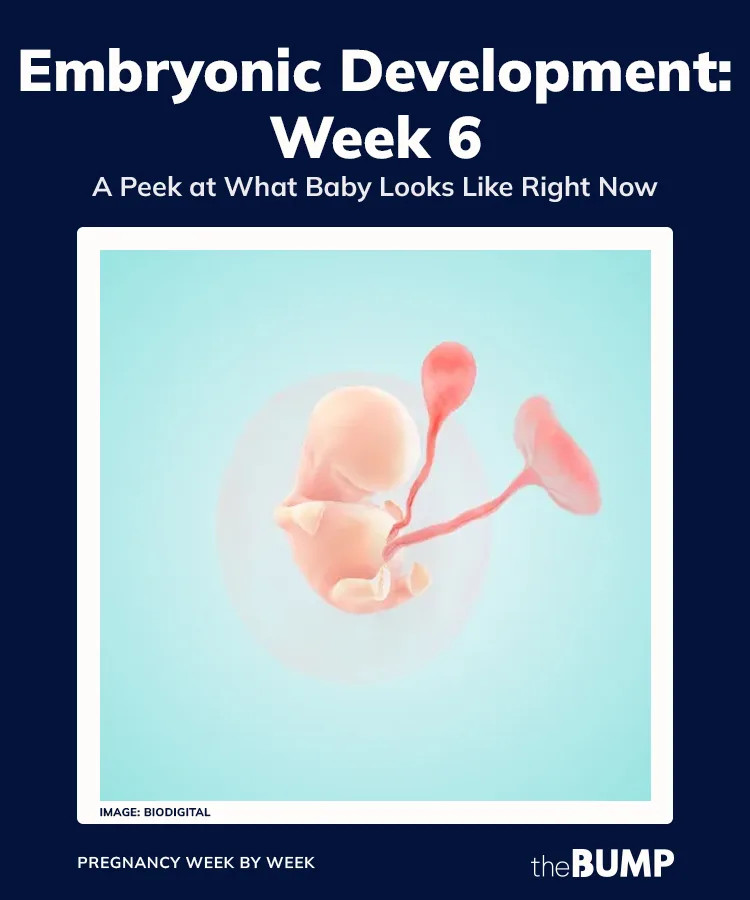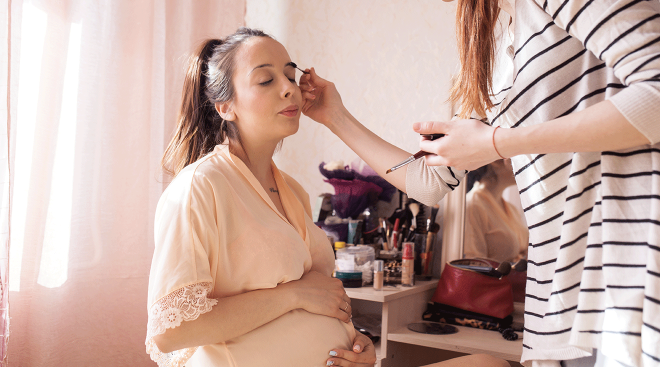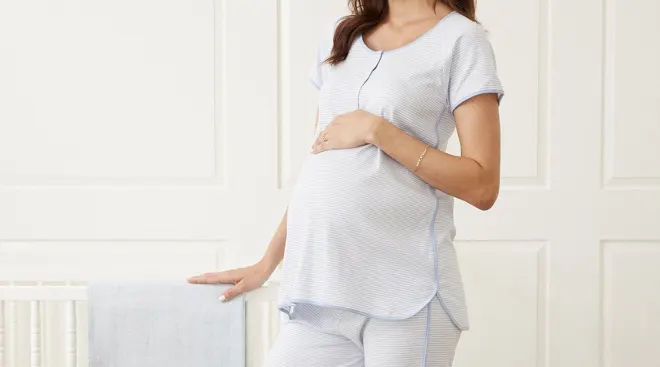- Things are getting real! If you’re not experiencing morning sickness, extreme fatigue or other unpleasant early pregnancy symptoms, consider yourself lucky.
- Baby’s heartbeat is most likely detectable by ultrasound at this point. If your doctor gives you an ultrasound at that all-important first visit, you’ll hopefully be able to see (and hear) that pitter-patter activity.
- It’s only been a few short weeks, but that embryo is looking more and more like a baby every day. They’re growing by leaps and bounds, developing complex organs and regulatory systems.
At week six, pregnancy is still new to you, so it’s normal to feel a little emotional. Add to that some pretty uncomfortable early pregnancy symptoms (which include hormone fluctuations that can feel like PMS—on steroids!), and it’s understandable to feel uncertain. That’s probably part of why you have 40 weeks to adjust to pregnancy. Of course, it’s also because baby needs all that time to get all their working parts in order. For updates on what’s happening with you and baby throughout your pregnancy, sign up for The Bump pregnancy week-by-week newsletter emails.
So what’s going on inside your 6-week pregnant belly? Well, many of the crucial areas of baby development have already started. Baby's circulating blood with an increasingly sophisticated circulatory system. The neural tube, which forms baby’s early brain and spine, is also closing. And the heart that has divided into four chambers and will start to beat this week.
Baby might even be wiggling their paddle-like hands and feet. Your 6-week embryo is about to get cuter too, as facial features are beginning to form. With a sprouting nose, eyes, ears, chin and cheeks, your 6-week-old-embryo is starting to look more baby-like.
While that curled up C-shaped little pea-size body still has a wee tail, it’s growing and developing fast. Baby now has an optic ventricle, which will eventually become the eyes, while passageways that’ll make up the inner ear are also starting to form. There are little limb buds that will become the chubby arms and legs you won’t want to stop kissing. Facial features are beginning to form too.
How big is baby at 6 weeks?
At 6 weeks pregnant, baby is the size of a sweet pea. The average embryo at week six is about .25 inches and will double in size again next week. Wow!
What does baby look like at 6 weeks?
Your 6-week-old-embryo is starting to look more baby-like. While that curled up little pea-size body still has a wee tail, it’s growing and developing fast. Baby now has an optic ventricle, which will eventually become the eyes, and a heart that has divided into four chambers and will start to beat this week. There are little limb buds that will become the chubby arms and legs you won’t want to stop kissing. Facial features are beginning to form too.
6 weeks pregnant is how many months
Remember, doctors generally refer to pregnancy by week, not month. If you’re wondering, “how long is 6 weeks pregnant?,” you’re one month and about two weeks pregnant—even though it’s probably been only a week or so since you learned you're expecting. Pregnancy is measured starting with the first day of your last menstrual period. You probably conceived in week 2 or 3, and didn’t discover your pregnancy until you missed your period around week 5.
6 week ultrasound
If you’ve let your doctor know you’re 6 weeks pregnant, they may have asked you to go in for your first prenatal appointment right away, but more likely, they may have told you to wait a few weeks. In fact, the first prenatal checkup is usually at about 8 or 9 weeks. So unless yours is a high-risk pregnancy, you probably won’t have a 6-week ultrasound. We know the anticipation is killing you!
If you did have a 6-week ultrasound, the doctor might be able to see a fetal pole or fetal heartbeat—a clear sign that you’ve got an embryo developing in there. However, if the doctor doesn’t see a fetal pole or heartbeat, don’t panic—you might not be as far along as you thought. The doctor will probably ask you to come back in a few days or a week for another ultrasound.
And yes, if you are 6 weeks pregnant with twins, you’ll likely be able to see two distinct gestational sacs or yolk sacs on the ultrasound at this point.
While you wait for your doctor’s appointment, you probably have a million questions on your mind. Write them down so you have them ready to ask your OB at your first prenatal visit. (Until then, we hope we’ve answered—and can continue to answer—a bunch for you.)
Because it’s still early in your pregnancy, you may not yet be experiencing symptoms—at this point, some women are terribly nauseous, while others feel almost nothing. At 6 weeks pregnant, either is normal, but the most common 6 weeks pregnant symptoms include:
Fatigue
You’re so drained because your body is still getting used to your changing hormones. Get extra rest if you’re feeling wiped out.
Nausea
Hate to break it, but morning sickness doesn't just happen in the morning. It can be an all-day affair. And moms-to-be who are 6 weeks pregnant with twins might have even more severe nausea. It’s a good idea to find foods that help settle your stomach and to keep them on hand for regular snacking, since having an empty stomach can trigger bouts of nausea.
Sore breasts
Your breasts are likely sore thanks to increased blood flow. Can you believe your body is already starting to prep to breastfeed your baby? Yep, even at just 6 weeks!
Frequent urination
If you find yourself having to pee more than usual, it’s in part because the pregnancy hormone hCG is directing extra blood flow to the pelvic area. Heading to the bathroom more often is normal, but if you have painful urination or have the urge to go but are unable to, tell your doctor right away. Those are signs of a UTI, which you’re at higher risk for starting at week 6 of pregnancy.
Gas and bloating
The pregnancy hormone progesterone can cause these tummy troubles. Drink lots of water and eat fiber-rich foods to avoid constipation (yuck), which contributes to bloating (double yuck).
Mood swings
Yup, crankiness and emotional extremes are because of the hormones. Fatigue and fluctuations in blood sugar can contribute, too, so get extra rest and regularly eat healthy meals and snacks to help keep your mood (at least sort of) in check.
Cramping and spotting
At 6 weeks pregnant—and any time in early pregnancy—cramping and spotting are both common. We know these symptoms can make you worry about problems like ectopic pregnancy at 6 weeks and other types of miscarriage. Know that if any abdominal pain is severe (stronger than period cramps) or if bleeding becomes heavy like a period, you should call the doctor.
How you might feel at 6 weeks pregnant
At 6 weeks pregnant, reality is sinking in. You might feel excited or nervous, or you might feel completely overwhelmed by the prospect of carrying baby for the next 34 weeks. These feelings are normal, and you might find you swing from one feeling to the next—also normal. Expect things to feel like they’re changing, because they are, and whether or not you feel physically different, it’s okay to feel however you feel.
Though it’s common to be bloated at 6 weeks pregnant, you likely don’t look pregnant at all. Inside your 6 weeks pregnant belly, your rapidly growing pea-sized embryo will soon take up a greater amount of real estate in your belly. So if you’re not ready to share your news with the world, you can enjoy your little secret for a little longer. Of course, if you’re 6 weeks pregnant with twins, belly expansion will happen a little sooner than it will for other moms-to-be.
What does a pregnant belly feel like?
So how does your stomach feel in early pregnancy? Your 6-weeks-pregnant bump isn’t much of a bump yet, so you’re the only one who will notice any differences. That said, since you’re probably starting to feel some cramping and bloating, your belly might feel a little bigger than normal. If pants feel tight or uncomfortable, now’s the time to integrate some stretchier waistbands to give that tummy room. Whether that tummy expansion currently comes from your growing baby or just gas doesn’t really matter as long as you’re as comfy as possible.
Anxiety in the earliest weeks of pregnancy is really common and often manifests physically for mamas. This is one of those times where really trying to connect with your body through mindfulness and meditation can be very powerful in managing your anxiety and getting you through those first few weeks!”
Ready to feel like yourself again? Here, some tips to live your best life at 6 weeks pregnant.
Prepare for your first prenatal appointment
You’ll have a lot of questions at the first appointment, so make sure you write down anything that comes to mind before you see your doctor. Take note of symptoms, family history and any concerns that might arise as you get closer to your very first prenatal checkup.
Be conservative
Baby is still in the early stages of developing all their critical systems, so now is the time to play it safe. Go light on caffeine, get extra sleep and steer clear of any activity that could expose you to chemicals or extreme temperatures (hot tubs and saunas are a no-no). Just focus on taking good care of yourself instead.
Go when you gotta go
Pregnant women have a higher risk of developing UTIs, so make sure you drink lots of water and don’t hold it when you have to pee. Needing to pee often is normal when you’re pregnant, but feeling like you constantly have to go or feeling burning or pain when you pee are signs of a UTI.
Find balance
It’s hard to eat all the right things and get daily exercise when you’re exhausted and want to puke all the time. You don’t have to be perfect—just find balance. Sneak in a walk or a light yoga session when you have the energy. Eat well when you can stomach it, but when all you can handle are bland carbs, try rice cakes or popcorn to get a little nutritional value.
Frequently Asked Questions
What are ways to relieve pregnancy gas and bloating?
Gas and bloating is common during early pregnancy thanks to higher levels of the hormone progesterone. It acts as a muscle relaxant and subsequently slows the movement of food through your bowel. That can lead to constipation and pockets of gas. Doing things like staying active, changing your position, staying hydrated and eating foods that are less gaseous (limit the brussels sprouts) can help relieve discomfort and bloating during this time.
When should I be concerned about early pregnancy cramping?
Some cramping in early pregnancy is normal, as the embryo continues to implant itself in your uterus. Cramping that doesn’t improve with rest, that’s located on one side, feels painful or that’s accompanied by symptoms like lightheadedness, nausea or bleeding should be addressed with your healthcare provider.
What are some foods that help with nausea during pregnancy?
Unfortunately, morning sickness is common during pregnancy, but some foods may help relieve nausea. Bland foods like rice, toast, applesauce and bananas may help, as well as foods with simple sugars like fruit juice or fruit. Some people also find that ginger or mint can help quell uneasiness. If you’re really struggling with nausea, talk to your healthcare provider. They may recommend medications.
What are normal hCG levels at 6 weeks of pregnancy?
Human chorionic gonadotropin (hCG) is a hormone that supports your pregnancy. It’s critical in establishing and maintaining a healthy pregnancy, and it supports the placenta and development of the early embryo. Every healthcare provider and lab may have a different threshold range for normal hcG levels by week of pregnancy. That said, it’s not really something your doctor will share with you as it can vary significantly.
Is there a heartbeat at 6 weeks?
There’s typically a fetal heartbeat at six weeks, but it may be difficult to capture on all ultrasound machines at this early stage. It’s also unlikely to be captured with a fetal doppler. In other words, if your provider isn’t able to find a heartbeat yet, it doesn’t necessarily indicate a problem. They’ll follow up soon to confirm.
Being pregnant among the smells of New York City was a gag—literally. Every whiff of every subway, garbage pile or taxi-cab interior had me racing for a toilet (or, at least, a discreet street corner).
Please note: The Bump and the materials and information it contains are not intended to, and do not constitute, medical or other health advice or diagnosis and should not be used as such. You should always consult with a qualified physician or health professional about your specific circumstances.
Matthew Carroll, MD, is an ob-gyn and assistant professor of obstetrics and gynecology at Baylor College of Medicine. He earned his medical degree from the Mount Sinai School of Medicine in New York.
Christine Greves, MD, is an ob-gyn at the Winnie Palmer Hospital for Women and Babies in Orlando, Florida. She earned her medical degree from the University Of South Florida College Of Medicine.
American College of Obstetricians and Gynecologists, [Can I Use a Sauna or Hot Tub Early in Pregnancy?]https://www.acog.org/womens-health/experts-and-stories/ask-acog/can-i-use-a-sauna-or-hot-tub-early-in-pregnancy),,) September 2021
American College of Obstetricians and Gynecologists, Changes During Pregnancy
American Pregnancy Association, 6 Weeks Pregnant
American Pregnancy Association, Baby Development Month by Month
American Pregnancy Association, Care for Your Nursing Breasts
American Pregnancy Association, [Uterus Size During Pregnancy[(https://americanpregnancy.org/healthy-pregnancy/pregnancy-health-wellness/uterus-size-during-pregnancy/))
American Pregnancy Association, Pregnancy Gas
American Pregnancy Association, Your First Prenatal Visit
Cedars-Sinai, Ectopic Pregnancy
Cleveland Clinic, Fetal Development, March 2023
Cleveland Clinic, First Trimester, August 2022
Eunice Kennedy Shriver National Institute of Child Health and Human Development, Pregnancy
Johns Hopkins Medicine, First Trimester Fatigue
Louisiana Department of Health, Stages of Fetal Development - First Trimester
Malaysian Family Physician, Urinary Tract Infections In Pregnancy, August 2007
March of Dimes, Bleeding and Spotting From the Vagina During Pregnancy, April 2020
March of Dimes, Common Discomforts of Pregnancy, March 2022
March of Dimes, Morning Sickness
March of Dimes, Pregnancy Week by Week
Mayo Clinic, First Trimester Pregnancy: What to Expect, March 2022
Mayo Clinic, Fetal Development: 1st Trimester, June 2022
Mayo Clinic, Symptoms of Pregnancy, December 2021
Neurological Health Foundation, The Healthy Child Guide
Planned Parenthood, What Happens in the Second Month of Pregnancy?
StatPearls, Embryology, Eye, January 2023
Ultrasonography, Role Of Ultrasound In The Evaluation Of First-Trimester Pregnancies In The Acute Setting, April 2020
Ultrasound, Ultrasound Surveillance in Twin Pregnancy: An Update for Practitioners, November 2018
University of California San Francisco, Coping With Common Discomforts of Pregnancy
Learn how we ensure the accuracy of our content through our editorial and medical review process
Centers for Disease Control and Prevention (CDC), Facts About Neural Tube Defects](https://www.cdc.gov/ncbddd/birthdefects/facts-about-neural-tube-defects.html#),,) June 2028
Nemours Kids Health, Week 4
MayoClinic, Pregnancy Week by Week
Navigate forward to interact with the calendar and select a date. Press the question mark key to get the keyboard shortcuts for changing dates.















































